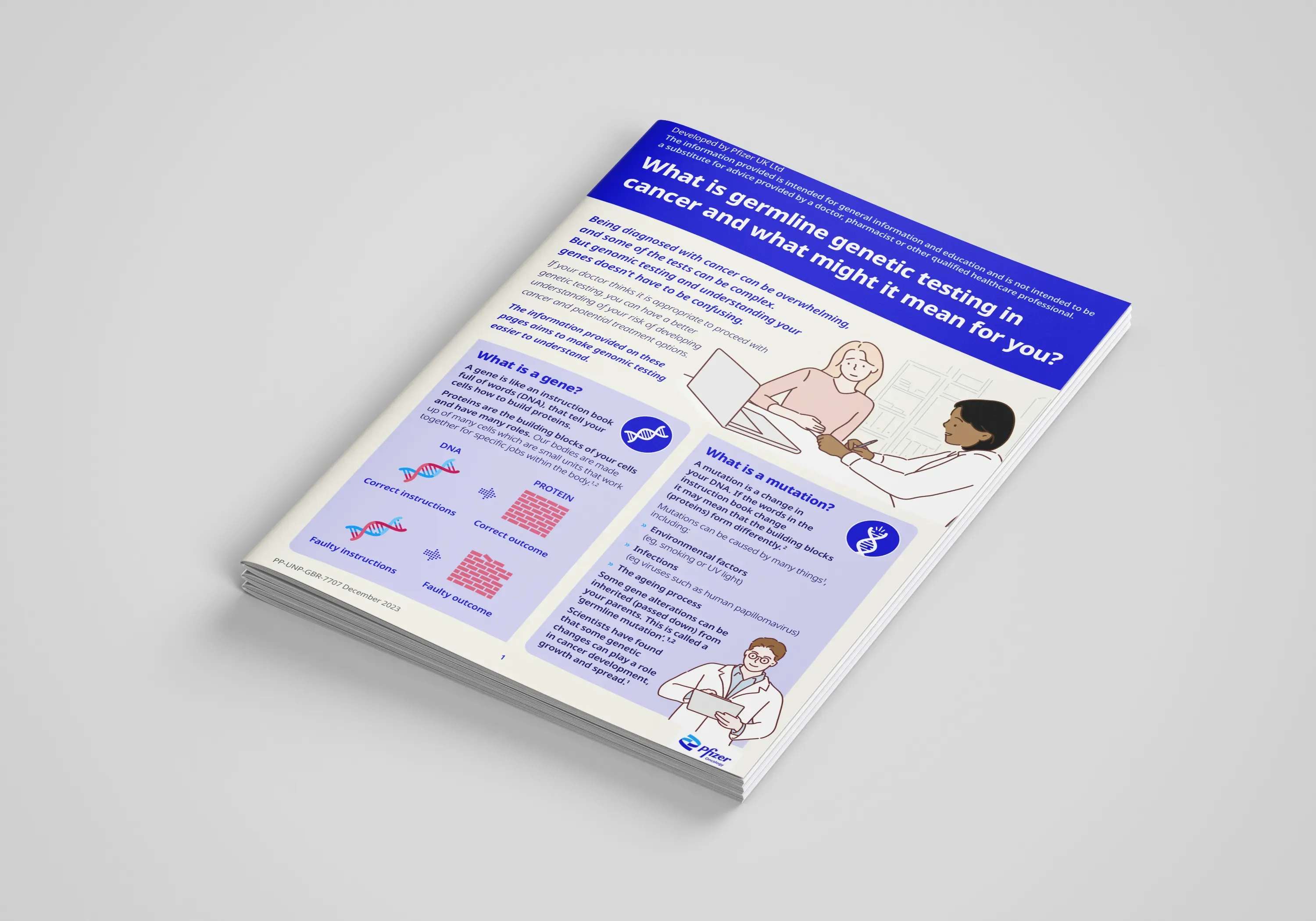The science of genes and how they can sometimes be linked to cancer can sound complicated. Let’s try and break it down a little…
Genes are coded messages that carry information about how our bodies grow and behave. They are found within our cells: the building blocks of our bodies.1,2
Sometimes changes occur in the gene. These are known as mutations. They can damage the cell and affect how it works. Changes in some genes can increase the risk of getting certain diseases or cancers.1,2
Gene changes can happen throughout your life, or they can be passed down from parent to child. When passed down, these are called inherited mutations.1,3
Read on to learn more about how genes and cancer are connected and visit our page on Genetic testing and cancer to learn more about how genetic changes are found.
What types of cancers can be inherited?
Most of the time, cancer is not inherited.1,2,3 But, if you inherit a gene mutation, you may have a higher chance of getting certain types of cancer compared to someone that doesn’t have that mutation.1,2,4
Examples of gene changes that can be passed down from parent to child and increase their risk of getting different types of cancer, include:
- Mutations in the BRCA1 and BRCA2 genes – a change in one of these genes is linked to a higher chance of getting either breast, ovarian, prostate or pancreatic cancer.4,5,6
- The APC gene which helps control how your cells grow. A change in this gene is linked with a higher chance of getting bowel or stomach cancer.7,8
What is a family history of cancer?
A family history of cancer looks at who in your family has had cancer:1,2,9
- The types of cancer they have had
- How old they were when they had cancer
- How they are related to you and each other
This information can be used to work out if you have a strong family history of cancer.
Having a strong family history of cancer may mean you have a change in one of your genes, passed to you at birth by your parents, causing you to have a higher chance of getting cancer.1
It is important to know that having family members who have had cancer, does not always mean you will get cancer too.2 It is more likely that cancer has been inherited when someone gets it young (below the age of 50).2 But there are cancers that are common at a younger age which are not inherited.1
‘My Dad tested positive… it was terrifying… but you’re absolutely not alone’
Charlie underwent genetic testing at 20 after her Dad’s genetic test was positive. You can watch her video below.
Hi, I'm Charlie.
I'm 26, and I found out that I'm a carrier of the BRCA2 genetic mutation when I was 20 years old.
I first found out that, you know what BRCA actually is because my parents are Ashkenazi Jewish.
My mom's a doctor, and she found out that they were doing a national study on Ashkenazi Jews around the country to find out what the increase was in our chances of being BRCA2 carriers since in our community there's a much higher risk of carrying certain genetic mutations.
My mom sat me down and told me about it and it was really scary at first because we didn't have any history of breast cancer in our family but my dad tested positive after they took part in a national study, and for me it was really terrifying information.
But I knew I wanted to get tested.
I knew that I wanted to start that journey, whatever it looked like and ultimately I felt that knowledge is power when it comes to testing.
And it's really important to arm yourself with as much information as possible.
So when I found out that I was a BRCA2 mutation carrier, what that actually meant for me was that it increased my risk of having breast cancer and developing it, which felt really scary.
And there are few options that I had at that point, either I could do nothing and just sort of hope that I was in that 30%.
I could increase my surveillance and go for regular mammograms and go down that route.
But for me, that felt like it would just produce a lot of anxiety over, you know, every year of my life when I would have to go in for those tests.
And then the third option was to have preventative surgery.
And that's the option that I ended up choosing to do, so when I was 22, I had a preventative double mastectomy where they reduced my risk of carrying, my risk of developing breast cancer, they removed all of my breast tissue and my nipples and put in implants instead.
I'm really happy that I made that decision. And I think that my life would be completely different if I hadn't.
I feel like I have so much more agency. I had so much more control over my body and the risks that I was putting myself in front of.
And I really am a huge advocate for anyone who's considering getting tested for anything that's a genetic mutation, whether that be BRCA or something else in their family.
If I had to give one piece of advice for people going through testing it is to do your best to find someone that's been through this before you, because there will be people.
It might feel like you're alone, but you're absolutely not and it's so important to create a community around you of people that are going to support, know what you've been through, probably know more about it than you do and can show you what life looks like after testing, whether that result be positive or negative, it will be fine.
And actually, I'm really pleased that I got the result that I did because it's meant that I found this incredible community of people all around the UK, and I'm just a huge advocate of testing for that reason.
If you think you may have a strong family history of cancer, a good first step is to talk to your family, especially those who have cancer. Visit our page on Genetic testing and cancer to learn more about how genetic changes are found.
Understanding genes, genetics and inherited cancers can be difficult. Speak with your doctor or healthcare team if you have any specific questions. They will be able to offer guidance based on your individual situation.

What is genetic testing in cancer and what might it mean for you?
We’ve summarised some of the key information around genetic testing and cancer into a more readable form. You can download it here, to help you and your family navigate these personal decisions.
References
- Cancer Research UK. Family history and inherited cancers. Available at: https://www.cancerresearchuk.org/about-cancer/causes-of-cancer/inherited-cancer-genes-and-increased-cancer-risk/family-history-and-inherited-cancer-genes [Accessed: June 2025].
- Macmillan. Family history, genetics and cancer. Available at: https://www.macmillan.org.uk/cancer-information-and-support/worried-about-cancer/causes-and-risk-factors/family-history-genetics-and-cancer-risk [Accessed: June 2025].
- Macmillan. Acquired and inherited cancer gene variants. Available at: https://www.macmillan.org.uk/cancer-information-and-support/worried-about-cancer/causes-and-risk-factors/genes-and-cancer [Accessed: June 2025].
- NHS. Predictive genetic tests for cancer risk genes. Available at: https://www.nhs.uk/tests-and-treatments/genetic-tests-for-cancer-risk/ [Accessed: June 2025].
- Cancer Research. Inherited genes and cancer types. Available at: https://www.cancerresearchuk.org/about-cancer/causes-of-cancer/inherited-cancer-genes-and-increased-cancer-risk/inherited-genes-and-cancer-types [Accessed: June 2025].
- NICE. Familial breast cancer (breast cancer in the family). June 2013. Available at: https://www.nice.org.uk/guidance/cg164/resources/familial-breast-cancer-breast-cancer-in-the-family-pdf-246406340293 [Accessed: June 2025].
- Greco. K and Mahon. S. Common hereditary cancer syndromes. Seminars in Oncology Nursing 2004; 20(3): 164-77: doi: 10.1053/j.soncn.2004.04.003.
- Macmillan. Familial adenomatous polyposis (FAP). Available at: https://www.macmillan.org.uk/cancer-information-and-support/worried-about-cancer/causes-and-risk-factors/familial-adenomatous-polyposis-fap [Accessed: June 2025].
- National Cancer Institute. Genetic testing for inherited cancer susceptibility syndromes. Available at: https://www.cancer.gov/about-cancer/causes-prevention/genetics/genetic-testing-fact-sheet#:~:text=Having%20an%20inherited%20harmful%20genetic,in%20one%20of%20these%20genes. [Accessed June 2025].






